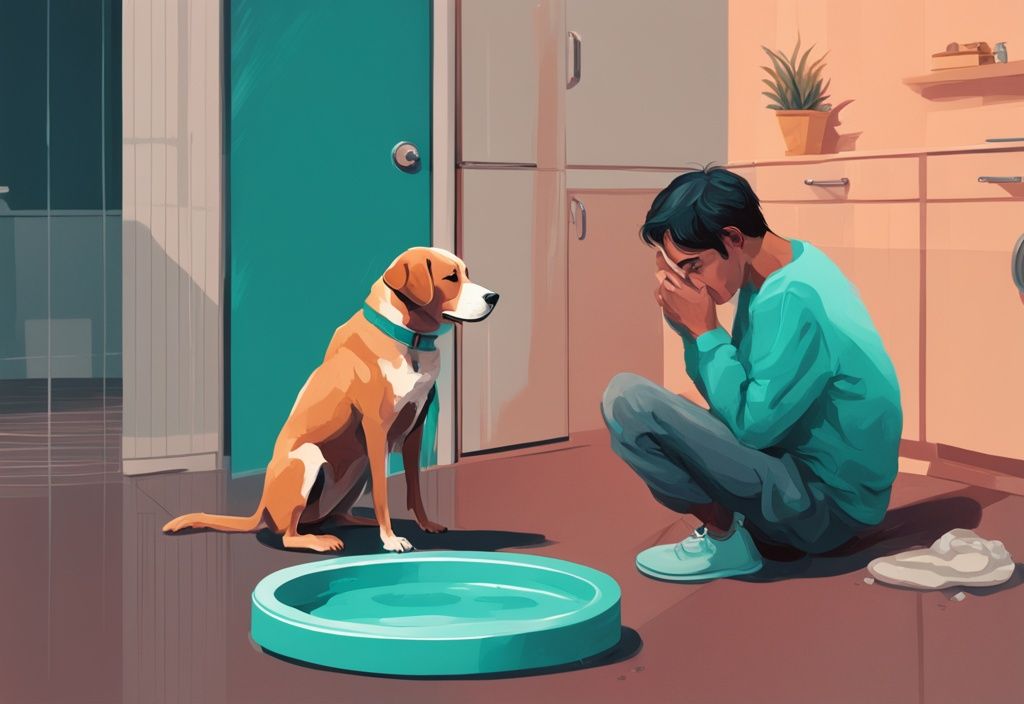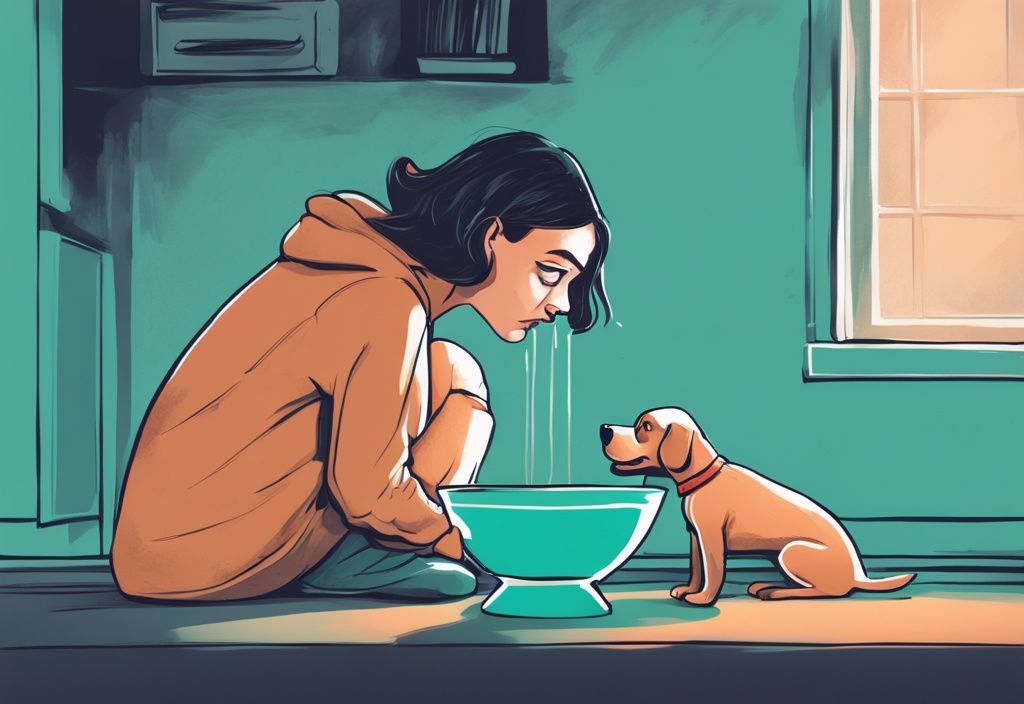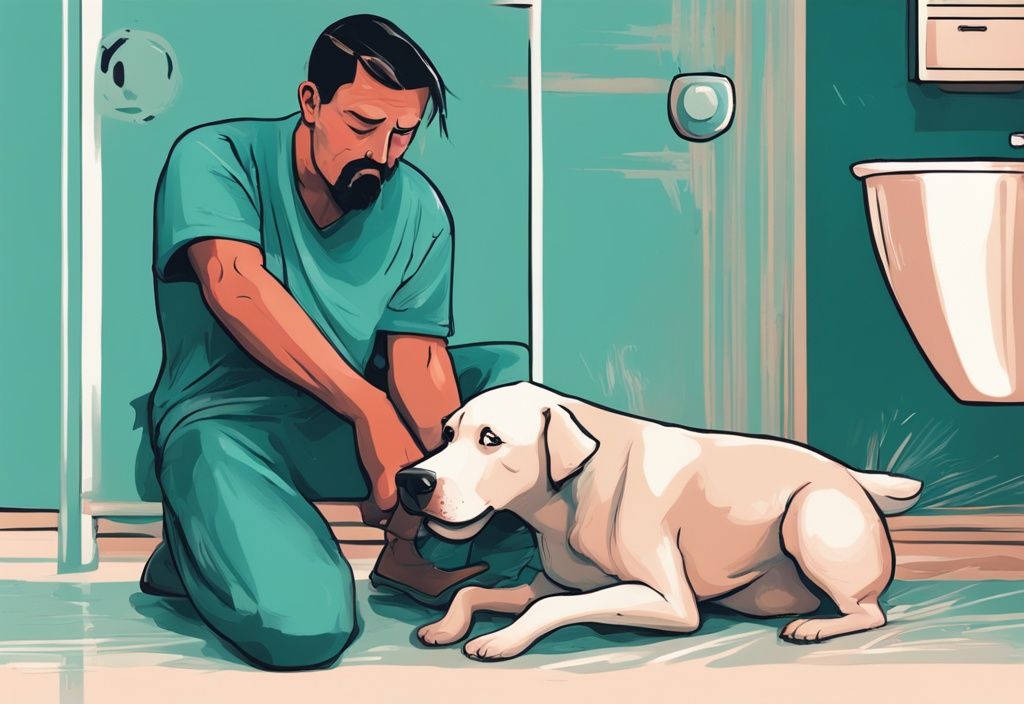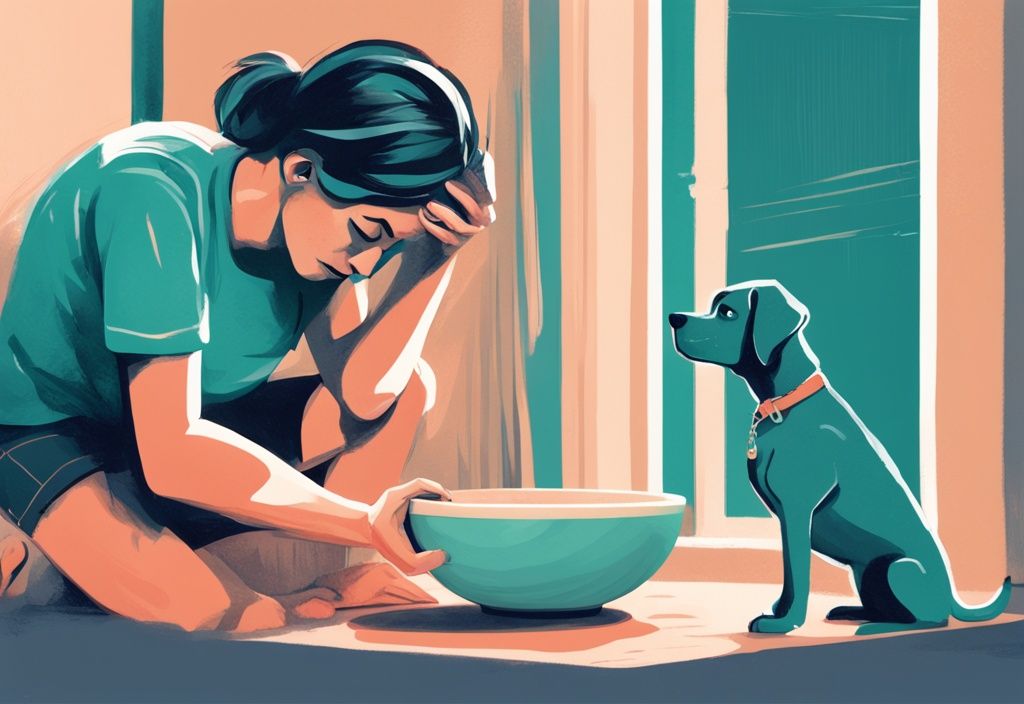“Oh, puddles! Did your pup upchuck after hydrating again?” Whether you’re new to dog parenting or a seasoned veteran, this can cause not just a mess, but concern too. Fret not though. Your friend Lily is here to guide you along this tricky path.
You see, there are quite a few reasons why our four-legged friends might transform their water bowls into spew fountains. From them lapping up water faster than Max, my Border Collie, chases his tail, to pesky underlying health issues. Together, we’ll break down these mysteries like a game of fetch.
In this journey, I’ll provide some helpful tips so you can wave goodbye to your doggie’s water-derived yacks. Read on to fortify your knowledge and help your pup avoid uncomfortable, hurling moments, ensuring tail-wagging, carefree days for you both.
Identifying the Reasons Behind Your Dog’s Vomiting After Drinking Water
Vomiting after drinking water can be quite a puzzling and concerning issue for many dog owners. Several factors might contribute to this, ranging from how quickly they drink, to the temperature of the water, and even what they’re drinking. Let’s dive into some common causes and how you can help your pup avoid these unpleasant episodes.
Excessive Drinking: Understanding Rapid Water Intake
Have you ever watched your dog gulp down water like they’re in a drinking contest? That might be why your furry friend is throwing up afterward. Particularly after a vigorous play session or a long walk, dogs can get overly excited and drink water too quickly. This hurried guzzling can overwhelm their digestive systems, leading to regurgitation. Think of Max, my energetic Border Collie, who always seems to think the water bowl might disappear! These rapid sips can not only cause vomiting but, in some cases, lead to more severe issues like water intoxication or hyponatremia, where the body struggles to balance its water levels.
The Role of Cold Water
A cold, refreshing drink sounds perfect after exercise, right? Not so much for our canine companions. When dogs drink ice-cold water, especially after some tiring activity, the sudden chill can cause their stomachs to contract sharply. This reaction often results in vomiting. Imagine offering Max a frosty drink after fetching his favorite tennis ball for a while—it might seem like a treat but could end up upsetting his tummy instead.
Implications of Contaminated Water
Ever noticed how Whiskers, my rescue cat, is incredibly picky about clean water? Max, on the other hand, isn’t as discerning. Dogs often lap up water from various sources, sometimes not the cleanest ones. Pools, lakes, or even puddles can harbor bacteria, parasites, and other nasty stuff that can wreak havoc on their stomachs. Blue-green algae, in particular, is quite toxic and can cause immediate vomiting. Parasites like Giardia can also be sneaky culprits, upsetting your dog’s gastrointestinal system and leading to vomiting bouts. Keeping fresh, clean water available is vital. You may be wondering, “Is tap water safe for dogs to drink?”
Food Allergies or Sudden Diet Changes: How Do They Affect Your Dog?
Dietary changes can be tricky. An abrupt switch in food or sneaking table scraps can sometimes upset your dog’s stomach. Spoiled food or sudden introduction of allergens might lead to your dog vomiting after drinking water. It’s something I’ve had to learn the hard way with Max—his tummy can be quite sensitive! Staying consistent with a balanced diet and avoiding any sudden changes or potentially contaminated food can make a big difference in preventing those watery and worrisome vomiting episodes.
Recognizing Medical Conditions That Cause Vomiting After Water Consumption
Common Examples: Laryngeal Paralysis and Esophageal Dysfunction
When scratching your head over “why does my dog throw up after drinking water,” you might need to dive into medical conditions like laryngeal paralysis and esophageal dysfunction. Think of esophageal dysfunction as a faulty conveyor belt that can’t quite get food and water into the stomach right. This hiccup can lead to regurgitation and, yes, vomiting. Imagine your pup trying to swallow but ending up with a throat full of liquids.
Laryngeal paralysis is another tricky player. Picture the muscles meant to control the larynx (aka the voice box) going on strike. Older or larger breeds are the usual suspects here, often dealing with choking, gagging, and that dreaded post-drinking puke. Other culprits could be benign tumors, a stretched-out esophagus (megasophagus), hernias, or conditions like hypothyroidism, Addison’s Disease, and those pesky Spirocerca lupi worms.
Understanding Kidney Disease and Thyroid Issues
Kidney and thyroid troubles might be behind the “why does my dog throw up after drinking water” conundrum. If your dog is vomiting clear water, a vet’s visit is in order for some thorough testing. Metabolic hiccups like kidney disease, liver disease, and diabetes can rev up thirst and bring on that unfortunate barfing reflex.
Picture a dog with kidney woes trying to quench an unquenchable thirst because its body can’t filter waste properly. They end up drinking more than their fair share, and well, you know the rest. Thyroid issues can throw a similar wrench in the works, making it critical to pinpoint these health problems to manage excessive water gulping and the ensuing vomit-fest.

How Parasites and Bacterial Infections Affect Your Dog
Parasites and bacterial infections are more pieces in the “why does my dog throw up after drinking water” puzzle. Internal parasites, the ones mucking up the gastrointestinal tract, often lead to vomiting and strange stools. Think of conditions like tracheitis from kennel cough or a treacherous collapsing trachea—both can make your dog retch and spew fluids.
Viral villains like parvovirus are known to turn water consumption into a vomit trigger. Bacterial troublemakers in the gut can cause similar chaos, leading to frequent upchucks. Add a gastrointestinal blockage to the mix—thanks to swallowed objects or other reasons— and you’ve got a recipe for post-water vomiting, especially if your furry friend also lacks an appetite and appears generally down and out. With all these possibilities, attentive observation and timely vet visits are your best allies.
Practising Prevention: Avoiding Episodes of Vomiting After Drinking Water
The Benefits of Slow Feeding Water Bowls
Imagine your furry friend, Max, gulping down water like there’s no tomorrow, only to throw it all up a minute later. It’s frustrating and concerning, right? That’s where slow feeding water bowls can come to the rescue. These nifty bowls turn guzzling into gentle sipping. By incorporating barriers or using bowls designed specifically to slow down drinking, you can help ensure that Max drinks at a measured pace. This prevents his digestive system from getting overwhelmed.
Not only do these specialized bowls reduce rapid consumption, but they also contribute to smoother digestion. The slower pace allows his body to properly absorb and process the water, promoting overall digestive health. Think of it as savoring a gourmet meal instead of rushing through fast food; both Max and his tummy will thank you!
Regulating Water Intake: Tips and Techniques
When it comes to preventing the dreaded post-water vomit, regulating water intake is key. Instead of letting Max drink his fill all at once, try offering smaller amounts of water more frequently throughout the day. This method ensures Max stays hydrated without the risk of him gulping down too much too quickly, which can be quite a shock to his system.
Another tip is to mix water with Max’s food. This can help moderate the pace at which he consumes fluids. Elevated water bowls can also work wonders, making the drinking process more comfortable—especially for older dogs or those with throat issues. Remember, a happy throat often means a happy tummy!
Whenever you’re out and about, portable water bottles are a must. They’re not just practical; they also prevent Max from drinking from potentially harmful sources like puddles or stagnant pools. Those places can be breeding grounds for bacteria or parasites that might trigger vomiting.
Last but not least, a healthy diet and close monitoring of Max’s behavior are pivotal. Keep an eye out for any unusual signs, and act quickly if something seems off. Being vigilant ensures Max’s overall well-being and keeps those annoying vomiting episodes at bay.
So, next time you notice your dog throwing up after drinking water, consider these thoughtful and pet-friendly strategies. They’re designed to keep your furry friend’s tummy happy—and your worries at a minimum!
Knowing When It’s Time to Seek Veterinary Attention
Sometimes, even our best furry friends face health hiccups, and it’s crucial to know when to seek professional help. Identifying key symptoms can be vital in ensuring your pet’s well-being.
Warning Signs: Symptoms You Shouldn’t Ignore
If you’re wondering, “why does my dog throw up after drinking water,” recognizing critical symptoms can help determine when to seek veterinary attention. Persistent symptoms, especially in older dogs, can indicate serious conditions such as gastrointestinal blockages.
Be on the lookout for additional symptoms such as vomiting combined with diarrhea, poor appetite, lethargy, weight loss, changes in urination or defecation, a distended abdomen, and breathing difficulties. These signs often need immediate intervention.

Key symptoms that warrant a trip to the vet include:
- Vomiting more than once within a 24-hour period
- Lethargy
- Diarrhea
- Loss of appetite
- Dry gums
- Lack of skin elasticity
These could signal dehydration or severe underlying health issues.
Diagnostic Tests and Potential Treatments
If you are asking, “why does my dog throw up after drinking water,” professional veterinary care is crucial for accurate diagnosis and appropriate treatment. Routine checks and examinations by a vet are essential to identify the cause of vomiting.
Diagnostic tests may include:
- Blood tests
- X-rays
- Ultrasounds
These can help pinpoint issues like kidney disease, infections, or gastrointestinal blockages.
Once the cause is diagnosed, treatment can vary. Common treatments include:
- Anti-nausea medication to settle your dog’s stomach
- Small food portions to minimize digestive strain
- Fluid therapy to combat dehydration

Ensuring your dog has plenty of rest is just as crucial for recovery. For severe cases, especially continuous vomiting, the presence of blood, or concurrent diarrhea, an emergency veterinary consultation is imperative to prevent further complications. Your pet’s well-being depends on timely and appropriate action.
Conclusion
Let’s talk about the million-dollar question: Why does my dog throw up after drinking water? Understanding the various reasons behind this can help us as pet owners take the right steps to keep our pups happy and healthy.
First off, rapid water intake is a biggie. If your dog is gulping down water like there’s no tomorrow, it can lead to vomiting. Cold or contaminated water, food allergies, and certain underlying medical conditions also play a part in this not-so-pleasant scenario. Keeping an eye on these factors and managing your dog’s water intake can make a world of difference.
Now, let’s talk about bowls. It might sound simple, but the type of bowl you use can be super important. Slow-feeder bowls are fantastic for pacing your dog’s drinking, which helps in preventing that dreaded regurgitation. And here’s a pro tip: try elevating the water bowl. It’s like giving your dog a little dining table, making drinking more comfortable, especially for those breeds who are often prone to vomiting.
Another trick? Regulate your dog’s water intake. Offer smaller amounts of water but do it more frequently, particularly after they’ve been active or have just eaten. Always ensure the water is clean and safe; no one wants to drink from a dirty bowl, including your furry friend. When you’re out and about, use portable water bottles to prevent any tummy upsets from unsafe water sources.
Regular vet check-ups are like a health insurance policy for your dog. These visits can help catch any underlying issues, such as kidney disease, thyroid problems, or gastrointestinal troubles, that might be causing the vomiting. A good vet can offer diagnostic tests and appropriate treatments to nip these problems in the bud.
In summary, understanding why does my dog throw up after drinking water lets us put the right measures in place to keep them well. From choosing the right bowls to regulating water intake and keeping those vet appointments, all these steps contribute to a happy, healthy furry friend. So, here’s to more tail wags and less worry!
Frequently Asked Questions
Can rapid intake of water lead to serious health issues for my dog?
You bet! When your furry friend, like my exuberant Border Collie Max, drinks water too quickly, it can lead to serious conditions like water intoxication or hyponatremia. Imagine your dog trying to gulp down water after a playful chase—it can overwhelm their digestive system, causing regurgitation or even vomiting. While occasional rapid drinking might just be a funny incident, if it happens regularly, it’s worth a chat with your vet.
How can I distinguish between a health problem and normal behaviour when my dog vomits post drinking water?
Ah, the million-dollar question! Sometimes, a little upchuck after drinking is no big deal. But if your pup is like Max and keeps throwing up, it’s time to pay attention. Chronic vomiting needs a vet’s eye, especially if it’s paired with diarrhea, lethargy, loss of appetite, or unusual bathroom habits. Keep a diary of these incidents—note the frequency and any possible triggers. It’ll help you figure out whether it’s a quirky drinking habit or something more serious.
Which dog breeds are most prone to vomiting after drinking water?
You might be curious if certain breeds are more prone to this messy situation. Indeed, some breeds with sensitive tummies like schnauzers, frenchies, and pugs often find themselves in this soggy predicament. Brachycephalic breeds, those adorable squishy-faced bulldogs and pugs, with their compromised airways, also tend to vomit more often. And let’s not forget our senior pups or those with conditions like laryngeal paralysis or megaesophagus—they’re at a higher risk too.
What effective home remedies can I apply to prevent water-induced vomiting in my dog?
Looking for some tried-and-true tips? Start by offering smaller, more frequent servings of water and food. Elevate their bowls—trust me, it makes a world of difference! Max loves his slow-feeder bowl, which helps him pace himself. Always ensure fresh, clean water is available—after all, hydrated pups are happy pups. When you’re out and about, carry a portable water bottle to steer clear of any questionable water sources. These little changes can go a long way in keeping your pet happy and healthy.
